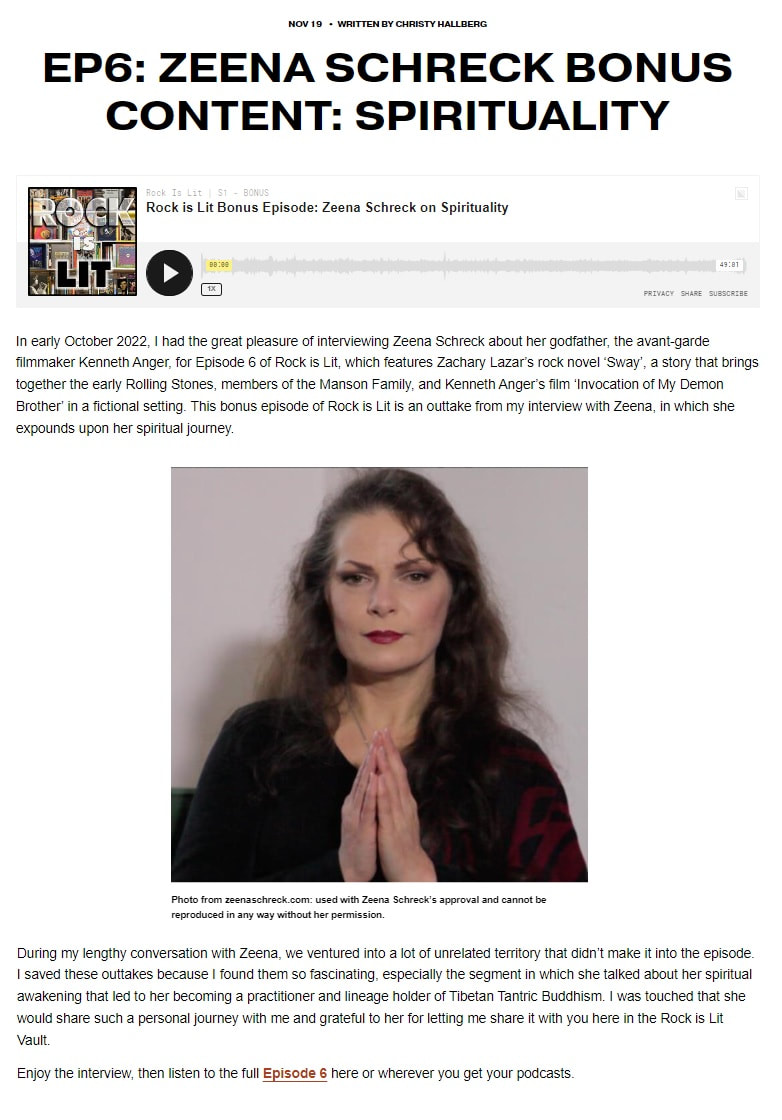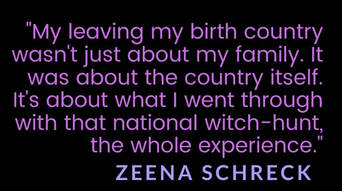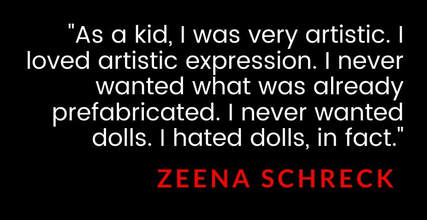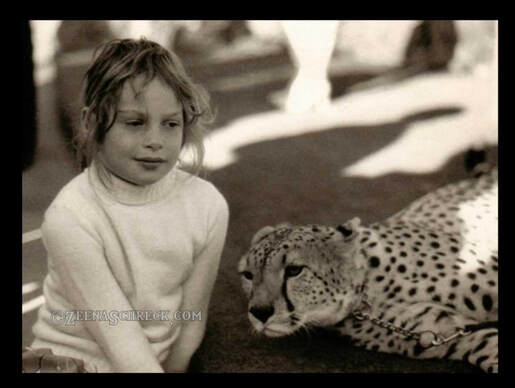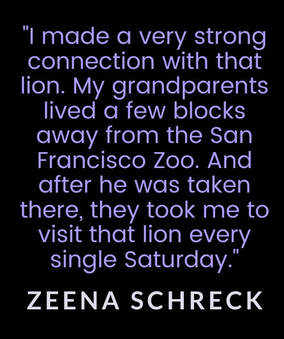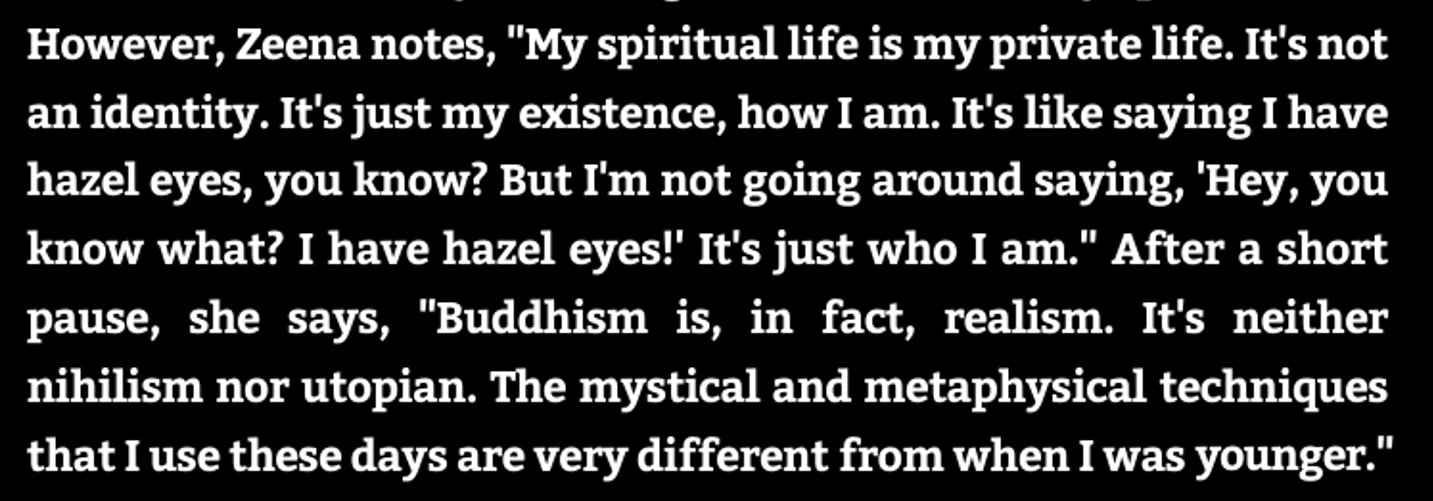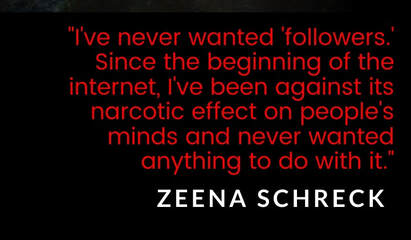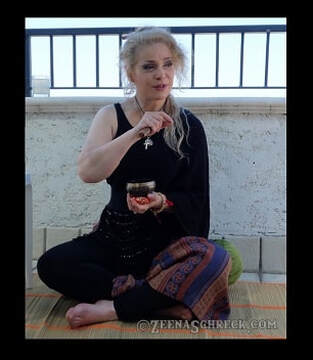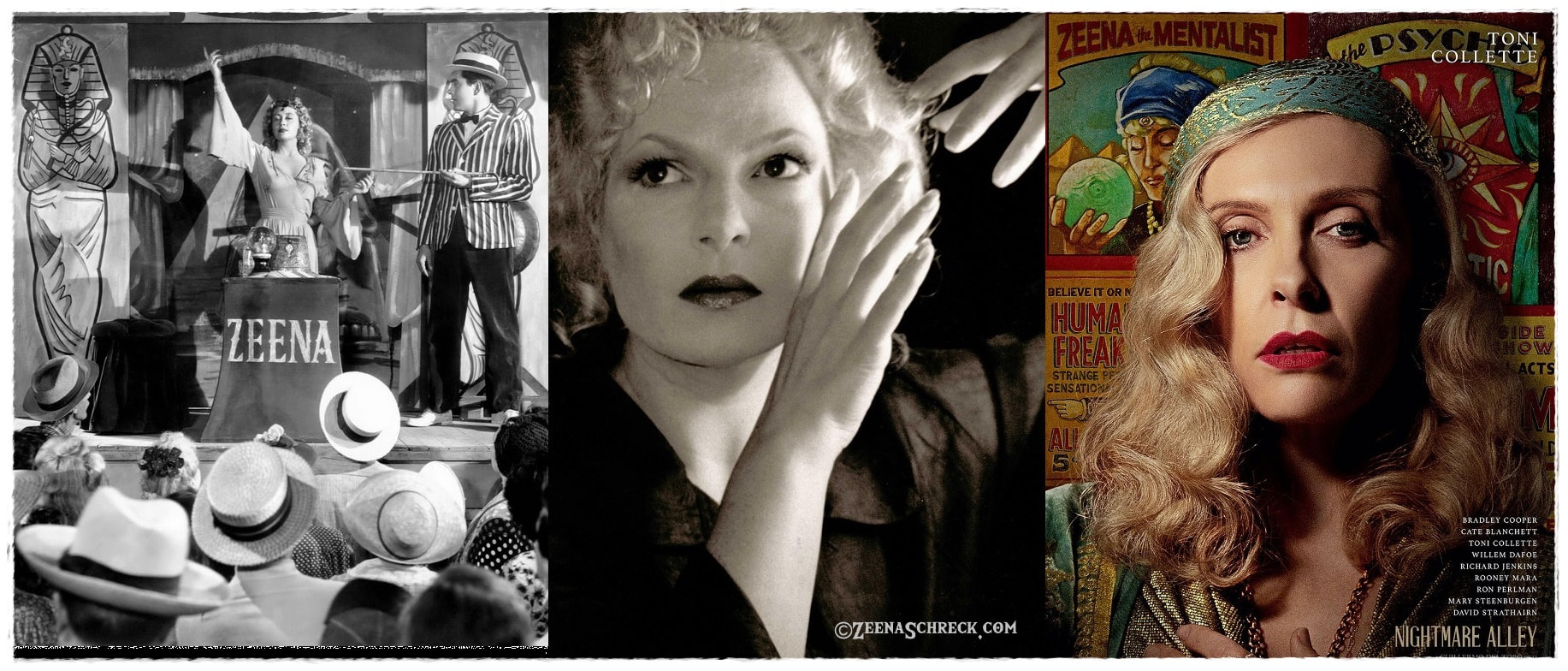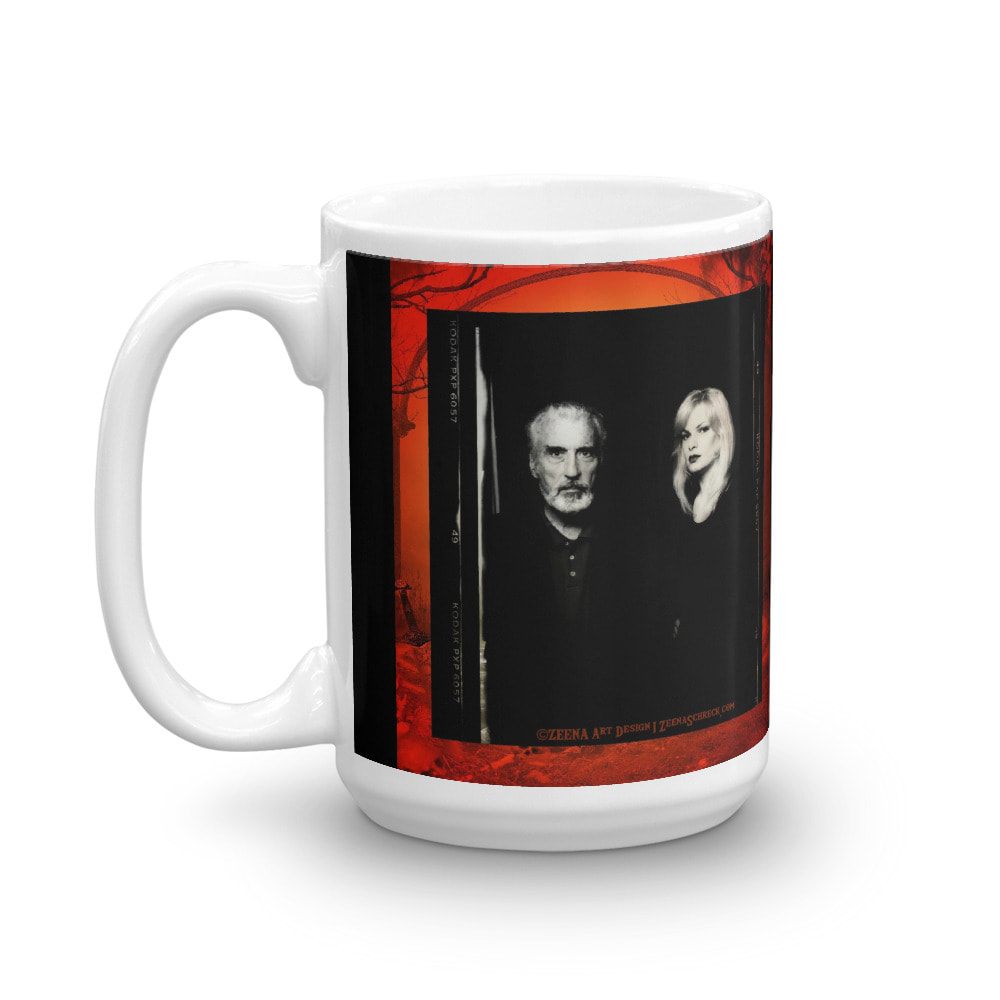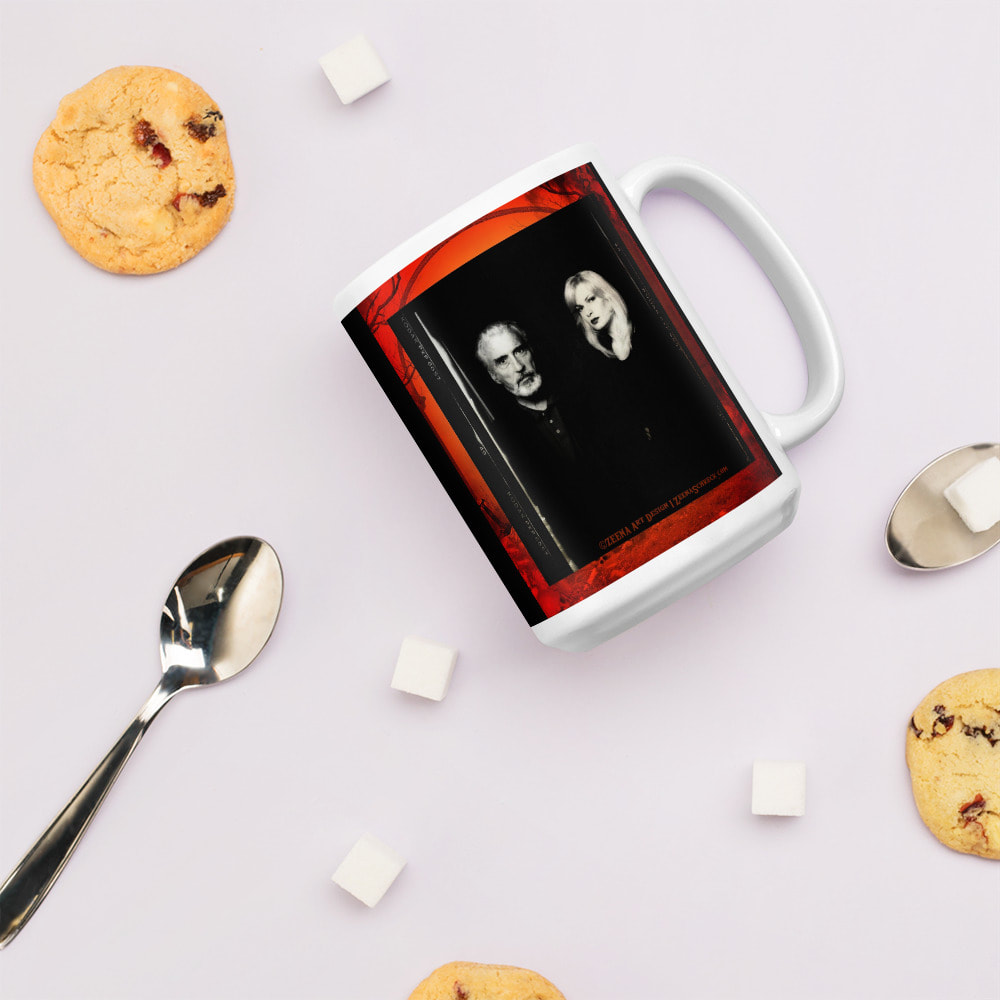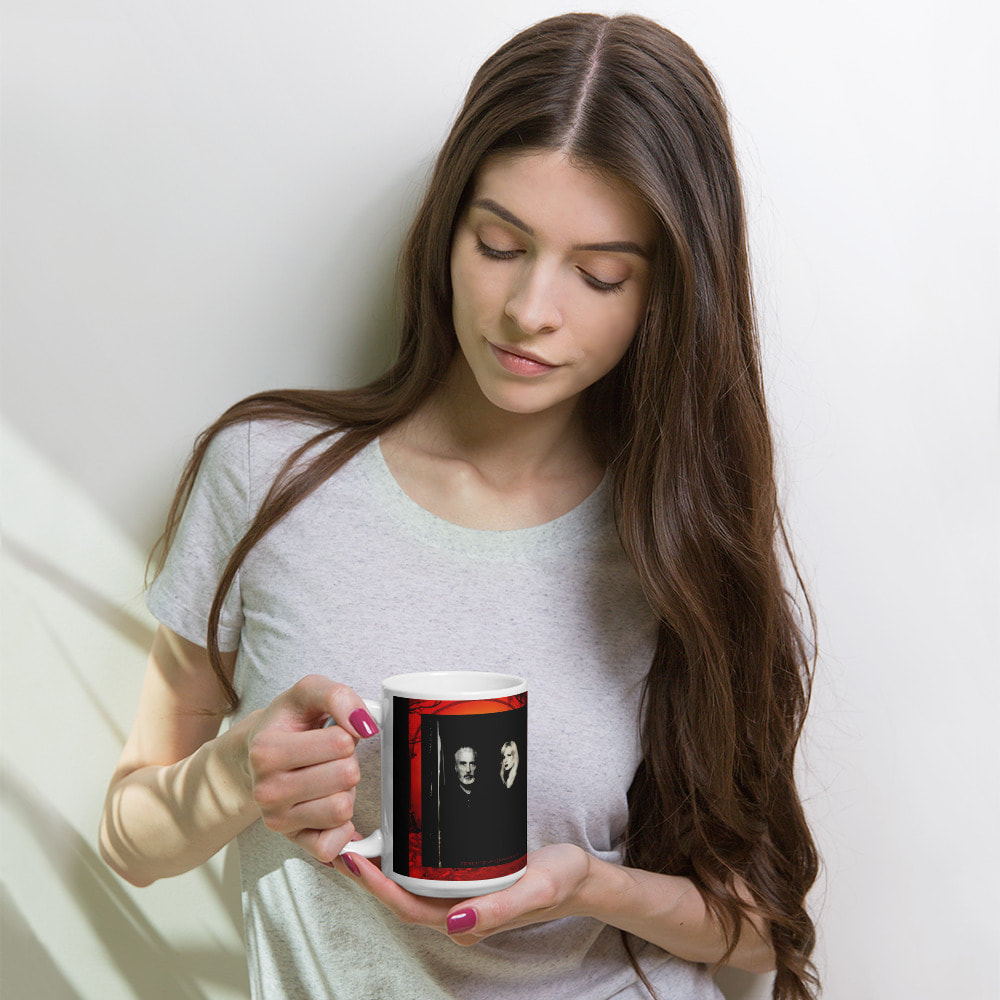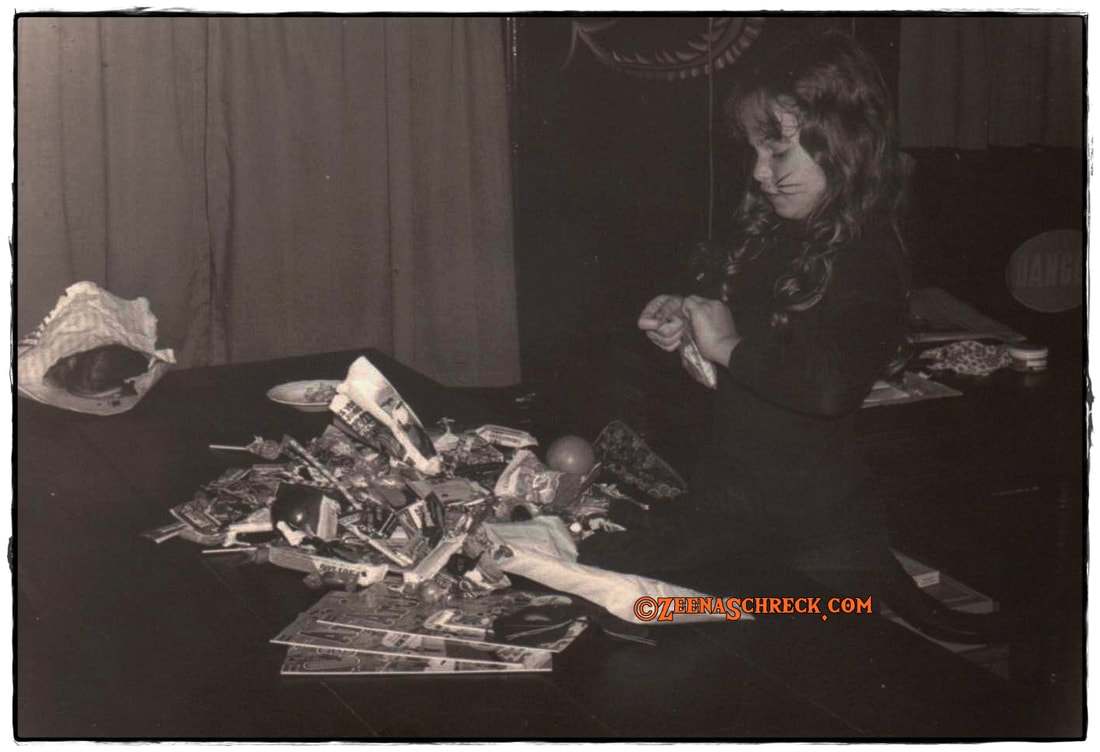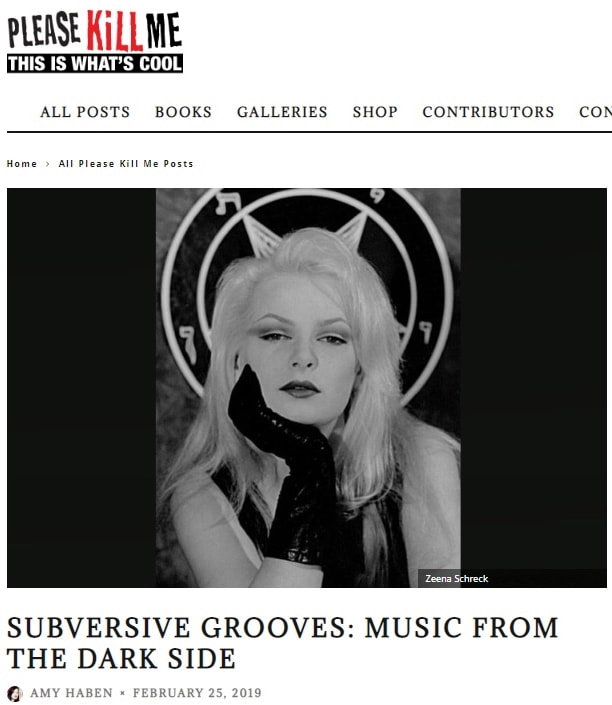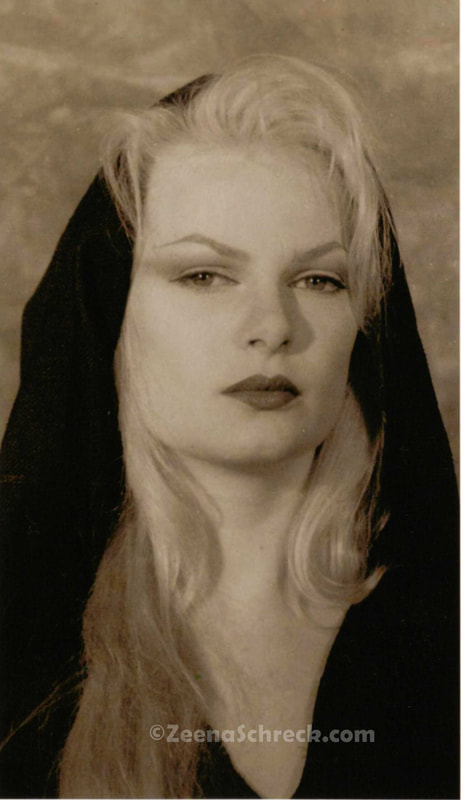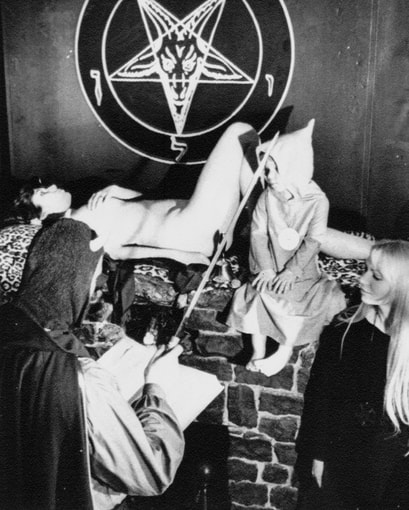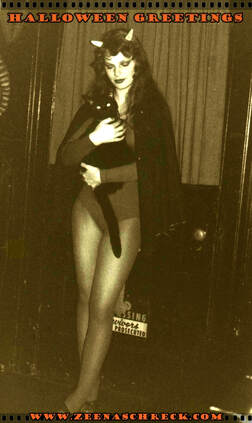 Author G. Connor Salter reached out to Zeena for this in-depth interview which extrapolates on the psychological and philosophical underpinnings of her father's choice to name her after the mystical fortune teller character, Madame Zeena, from the novel Nightmare Alley by William Lindsay Gresham. In the interview, Zeena covers her father's claims to have personally known Gresham, details about his early life history, his brushes with occult and esoteric groups in the '50s and other Noir influences on his early development, which in turn influenced Zeena's early development, making this a richly detailed and insightful exploration into the mind. The article also features photos of two vintage paperback editions of Nightmare Alley and a movie poster for the 1947 film, which lived in the kitchen of the Black House (Zeena's childhood home), from Zeena's personal archives. G. Connor Salter is known for his exhaustive research in and written contributions to scholarly studies of the 1930s-40s literary group The Inklings and by extension CS Lewis's wife Joy Davidman's first husband, Noir author William Gresham. Salter is currently working on the unpublished writings of Gresham to which this interview is a small portion of a larger project. Read the full interview here: punknoirmagazine.wordpress.com/2024/05/22/a-conversation-with-zeena-schreck-about-nightmare-alley-by-g-connor-salter/ [Posted by T.M. 24/05/24]
1 Comment
Signed and numbered print edition 2012 Vice Magazine 'The Showbiz' Issue, Volume 19 Number 4 Zeena's in-depth interview by Annette Lamoth-Ramos featured in this issue was the first after many years hiatus from mainstream media spanning her early life until the early '00s. After much interest and feedback generated from this interview, VICE invited Zeena to write her own column, 'From the Eye of the Storm' . In February 2024, VICE media announced they are stopping both the online and print magazines. BUT we have unearthed a limited number of print copies - 10 in English and 13 in German - all in original (not pre-owned) condition. Signed and numbered on the lead photo by Zeena, there's also an option to have it personalized on the TO ORDER PAGE. The Showbiz issue also features 'The Sordid Secrets of Babylon,' an interview with Zeena's godfather, Kenneth Anger (February 3, 1927 – May 11, 2023), who passed away exactly one year ago. [Scroll down to table of contents to see other articles in this issue.] Condition: Original, Mint to Very Good. Excellent binding, pages are unmarked and clean. Binding: Softcover High quality six-color printing on all pages, glossy cover. 114 pages. 8½”x11” / 21½cm x 28cm. The only differences between the English and German versions are: The English edition originally came with a paper wraparound advertisement on the cover for the action-adventure game Dishonored (see image). To offer collectors this item exactly as it was when it hit the stands twelve years ago, we're leaving it on. The German edition doesn't have any advertising on the cover but features a short write-up about photographer Florian Büttner, who did the photo shoot with Zeena and who gives his impressions of that experience. (See image below for the original German text, English translation follows.) This is photographer profile is only in the German edition and not included in any of the other VICE language editions of the same issue.  Text translates to: “Florian took pictures for us of Zeena Schreck, the apostate daughter of Church of Satan founder Anton LaVey. In Satanist circles, just mentioning her name leads to premature ejaculation. She is a kind of devilish demigoddess who probably desecrated hosts for the first time as a four year old and, at least until she broke away from her father, was on a first-name basis with Belial. Florian met her in a fairy-tale forest at Lake Grunewald and told us that it was quite a dichotomous experience, as on the one hand she looked like the evil stepmother from Cinderella with her baroque dress and stern appearance, yet on the other hand she spoke like the Buddha.” [Posted by T.M. 10/05/24]
Christy Alexander Hallberg of Rock is Lit explains:"In early October 2022, I had the great pleasure of interviewing Zeena Schreck about her godfather, the avant-garde filmmaker Kenneth Anger[...]. During my lengthy conversation with Zeena, we ventured into a lot of unrelated territory that didn’t make it into the episode. I saved these outtakes because I found them so fascinating, especially the segment in which she talked about her spiritual awakening that led to her becoming a practitioner and lineage holder of Tibetan Tantric Buddhism. I was touched that she would share such a personal journey with me and grateful to her for letting me share it with you here in the Rock is Lit Vault. Enjoy the interview, [HERE] then listen to the full Episode 6 here or wherever you get your podcasts." -- Christy Alexander Hallberg To hear the interview click on the screenshot below and scroll to end of this post for personal message from Zeena! Message from Zeena: My heartfelt thanks to Christy Alexander Hallberg for publishing the outtakes from our interview. As is often the case when being interviewed, off-topic questions organically come up and in this case Christy was able to inadvertently document what many have asked me about but which I haven't publicly discussed - my spiritual path and how I got to where I am now. As Christy presented this additional interview material to me as a birthday present, I not only thank her sincerely for that but also hope that anything of what I said is of some benefit to others on their own spiritual journey. Remember that every day you wake up and have the advantage of being alive, in a human body with human conscience and cognizance, and all the potential that comes with that, is a gift and a chance to begin a new life of your choosing. And last but not least, because my root Lama, who I speak of in this interview, also has his birthday so close to mine (same time of the year), I extend all the best birthday wishes and long life prayers to the Very Venerable Thrangu Rinpoche who turns 91 in a few days! Below is a video of last years prayers to him by his monastery in Canada. For those unfamiliar with Tibetan Buddhist types of liturgies and rituals in this video, this gives an idea of the practices to which I'm initiated, for which I'm so very grateful! As we enter into the dark months of the year, may your heart be filled with light and non-judgment and you become a beacon of radiant compassion and loving-kindness to all sentient beings around you. -Om Mani Padme Hum- Zeena P.S. As I first listened to the interview, the point where I'm describing the intermediate state of consciousness between one life before reincarnating into the next life, in Tibetan Buddhism known as the Bardo Thödol, which spans forty-nine days, I noticed that the total running time of this interview coincidentally came to forty-nine minutes! [posted by t.m.] Christy Alexander Hallberg interviews Zeena for Rock is Lit Podcast, Episode 6, focusing on rock novel ‘Sway’ by Zachary Lazar. Hallberg states, “In the final segment, I was so privileged to get the chance to talk with Zeena Schreck who was kind enough to share her memories of Kenneth Anger and her insight into some of his iconic films, especially the 1969 'Invocation of My Demon Brother', a movie that is the connective tissue of 'Sway'. Believe me you don't want to miss this episode.” 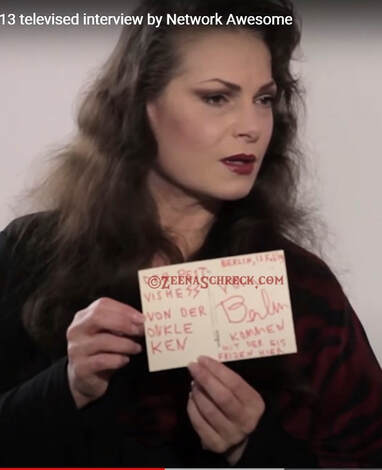 Rock is Lit Podcast description: “Zeena Schreck, who is an artist, musician, Tibetan Buddhist yogini, and the goddaughter of Kenneth Anger, as well as former High Priestess of the Church of Satan (founded by her late father Anton LaVey), shares her memories of Kenneth Anger, including how her father made him her godfather and her personal and working relationship with Kenneth. She also talks a bit about her background and rebuilding her life as a Buddhist in Germany. In addition to this, Zeena discusses Kenneth’s interest in Aleister Crowley; the making of and background on some of his iconic films, especially the 1969 film ‘Invocation of My Demon Brother’ (a movie that figures large in Zachary Lazar’s novel ‘Sway’); Kenneth’s relationship with Anita Pallenberg and her influence on the Rolling Stones; and how Kenneth’s work influenced MTV and music videos.” Zeena's part begins at the one hour mark: www.christyalexanderhallberg.com/rockislitpodcast/zacharylazar/tonysokol/zeenaschreck
In addition to the main interview, don't miss the bonus material with show notes and special photos from Zeena on the Rock is Lit Vault page : https://www.christyalexanderhallberg.com/podcast-vault-feed/zeenaschreck Zeena's music "Summer Swelter" and "ENDLICH DAHEIM”, from ‘Bring Me the Head of F. W. Murnau’ are segmented in her interview. [posted by T.M. Thursday 13 October, 2022; 15:50] 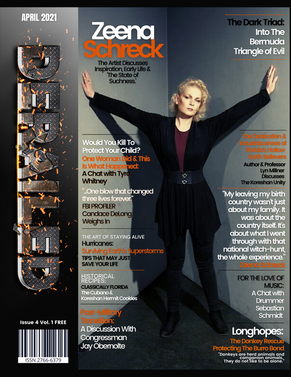 Zeena Cover Story in Derailed Magazine: Since the publication of this extra-long interview with Zeena for Derailed Magazine, many have requested to read it in a more user-friendly format. Specifically, some found the version on the Derailed website difficult to open and navigate to read all the way through whereas some non-native English speakers expressed that they would have liked a way to read the text through translation apps. For those reasons, we're archiving the complete interview text below in this post. The original full color hardcopy of the magazine (containing visuals not included in this post) is available at: https://www.derailedmagazine.com/april-2021 Many thanks to Daphne Minks Daly at Derailed Magazine for facilitating this in-depth, exclusive interview with Zeena! [Posted by Thomas] Eager Student, Humble Teacher Issue 4, Vol 1 April 2021 Words by Daphne Minks Daly. All Images copyright Zeena Schreck. Zeena Schreck has held many titles, avant-garde artist, musician, author, spiritual leader, and High Priestess, to name a few. These days, professionally, she's simply called ZEENA. Of all the monikers she's donned, the one that is truly her most beloved is, of course, that of yogi, or in its feminine form, a yogini. She states, "My life has taken a turn. One where I'm 'becoming.' I'm a yogi that lives out in the forest. I live a solitary existence. And that's somewhat necessary for the kind of spiritual path that I'm on." Her private existence makes penetrating Zeena's inner circle a difficult but not impossible task. These days, she's kept well-insulated from outsiders, and it's of little wonder why. In the eighties, her father's religious organization was the center of controversy and a worldwide media nightmare, thrusting her already highly publicized family further into the spotlight. Ultimately, at her father's behest, Zeena publicly took up for him and his organization, taking the heat for both while becoming its first public spokesperson. Although she resigned from her role and severed ties with her father in 1990, many people still mistakenly associate her with events leftover from decades ago. In many ways, the shadows of her past will always be there. In other ways, they're all but a faded memory. Her childhood house, which once stood in San Francisco, California, was demolished in 2001. Known globally as The Black House, the building was, for many, a symbol of opposition and religious freedom. For others, blasphemy, fear, and hatred. But, despite the controversy, for Zeena, it was just home. Refusing correspondence that addresses her by previous surnames or titles, she has done her best to distance herself from her former identity. A permanent resident of Germany for well over two decades, Zeena says, "My leaving my birth country wasn't just about my family. It was about the country itself. It's about what I went through with that national witch-hunt, the whole experience." The former High Priestess affirms, "In the eighties, there were so many factors that came together, that caused good reason to travel a very extreme distance. My mind was made up. And that was it, I just had to get away. And sometimes you have to go very, very far away in order to get your life and head together." Zeena thoughtfully explains, "I often compare that experience to a branch on a tree. The tree, representing the family, maybe has root rot and it's beginning to reach up through the trunk of the tree as it's growing. The root rot is beginning to infest with parasites and it's actually toxic and rotten. Yet, there are a couple of branches, maybe close to the top or sticking out at the side, that the root rot hasn't reached fully. It's getting close, but if you can snip them off and replant them maybe they've still got enough life in them that the toxic effect hasn't reached them completely." Continuing, she says, "Snip it off, replant it, get it into healthy soil with some sunlight and nutrients. Then that branch of the tree can grow and get healthy. But first, it has to be separated from the rot. I feel that about my life here in Europe, that I returned home. That I actually was in the wrong place before." Her artwork speaks to an old soul with an appreciation for German romanticism. Stating that her inspiration comes from a comfortability with solitude and vivid imagination skills, Zeena shares, "As a kid, I was very artistic. I loved artistic expression. I never wanted what was already prefabricated. I never wanted dolls. I hated dolls, in fact." She remarks, "What I really wanted was art supplies. Or... and this may sound weird, but things that were just for 'survival.' One year, I asked for an icebox so I could keep food in my room, to begin learning how to live on my own. I wanted to know how to be utterly, utterly self-sufficient." I wondered about her childhood and how growing up in The Black House may translate to her art. "Was I ever a child?" Zeena sarcastically asks herself before responding. "I was left for pretty much the whole day, everyday. My sister would be in school and my parents slept through the day. I developed the necessity, but also the ability...well, I mean, I had no other choice than for my imagination and mind to expand," she explains. Pondering for a moment, Zeena recalls, "Because they slept all day, my mother would leave my breakfast on a chair next to the crib so when I woke up, I could reach out and take it. She used to brag to her friends, 'Oh, Zeena! She's like a little monkey. I have her so well trained, she can feed herself.'" Clarifying, she says, "My parents were not 'kids' kind of parents, you know? I didn't really spend a bunch of fun time with them, unless it was my birthday, or a holiday or some other reason. Otherwise, I was very much left to my own devices. I developed the ability to entertain myself." Zeena remarks, "My mother didn't know what I was interested in. She was just working all the time. I would only associate quality time with her after a big blowup between my parents." Her father, she explains, contributed to her interest in art and music a great deal. "In my earliest life, he definitely spent more quality time with me than my mother, with things that interested me. He would play music or after dinner he'd sometimes draw with me and teach me about classical art and music. He hated rock and metal music and gave long diatribes about how stupid it was. So, I was raised with very traditional musical influences. My father's original profession was musician. That's what's written on my birth certificate, as his profession. That's what he did back then," she says, her voice softening. Zeena then remarks, "I started reading fairly early, thanks to my grandmother. Every weekend, when I went to their house, she would get me a new book from that series, Little Golden Books. The fairy tale books that I was reading, my mind would wander and kind of discover alternate realities." She finishes her thought by sharing, "In my earliest life, my grandparents were that little bit of stability in my life. Because they led a 'normal, regular life.' There were a lot of changes that happened very rapidly throughout those early years. In my life, in my family, and in my household." When I ask about her experiences attending school, Zeena's gentle but nervous laugh makes another appearance. She replies, "For the longest time, for the life of me, I could never remember my first day of school. But, when I was dealing with issues after leaving my family, I learned some self-hypnosis techniques. I began uncovering a lot of just very mundane, ordinary memories. One of the things I realized was why I couldn't remember my first day of school. It's because I didn't go." Zeena explains, "My mother wasn't aware that school had started. So, I started late. I'm pretty sure it was a couple of weeks late." She goes on to say, "I spent so much time alone and was not socialized very early in life. It was a big problem when I started school. I was a little like a wild animal. I didn't really know how to behave for school." Recalling her first day at school, she describes, "All the other kids were already well-trained. The teacher said, 'We're going to get graham crackers before we take a nap.' And everybody got into 'formation,' to get their crackers. I didn't know the concept of science fiction, but it was all just weird!" she laughs. "When the teacher said, 'It's time to take a nap with your head down on the desk,' I wouldn't put my head down. I thought, 'I want to go outside and play!" She points out, "Of course, given the philosophy that I was raised with...that my parents made clear in interviews, and this is their words, by the way, they raised me 'by the laws of the jungle.'" She explains further, "I was able to be very independent and of course, that made my parents very happy - less work for them. I always kept to myself. I was always a loner. Unfortunately, that made me easy prey to be picked on and taken advantage of in a lot of ways. So, I learned how to fight early too," Zeena says. "Most of my life I hated school, but it wasn't that I hated learning. It wasn't that I didn't like my teachers. It was just...the problems I had in school because of my parents' notoriety, definitely caused serious problems for me. So, I took the GED to get out early," she shares. Zeena details, "It wasn't until much later in life that I could unravel how much of my behavior was a reaction to the way I was treated by other kids, and societal influences. And how much was inherent to my natural character." She discloses, "I've always had one or two very close friends, and I'm still that way, actually. I was never one of these girls that had a gang of girls they hung out with or some club at school that was their own clique." She expands by saying, "The only places I can recall that I felt safe was with a favorite uncle and two particular friends in my neighborhood. I always used to wish that they would just adopt me." With a childlike chuckle, she elaborates, "I was the stray dog at their door at dinner time. Like, 'Can I just kinda hang out here for a while?" About her childhood friends, she shares, "Their parents were kind enough to give me a little refuge, some shelter, even if just for a few hours, it was enough for me to get a breather." Taking a more serious tone, Zeena says, "Although I, myself was not a victim of parental physical abuse, there are many studies showing the effects of domestic violence between parents on the children." The artist emphasizes, "Even if the children are not being physically beaten themselves, it's just as damaging. Because they're living in a constant state of anxiety, of never knowing when something's going to blow up or where they stand. The stability of the household is totally shot." In the early years, death threats, nightly vandalism, stalkers waiting outside of the home, and hate mail were common occurrences due to her parents' notoriety. Zeena highlights, "In my case, I not only had violence in the household but violence outside of the household as well. I really had nowhere peaceful." "I used to feel like a lone wolf or a jungle cat that must fend for itself, like a jaguar," Zeena details. "I had a very strong connection to animals and still do obviously. My connection to other humans was far weaker. It probably still is," Zeena admits. "I so identified with animals. As I said, I was not socialized when I was a kid. But we did have a lot of animals and I was really tightly linked to them. Not only to our animals but to all animals." Her family's various exotic pets were also the source of another much-publicized debate. Most of the focus was placed on the family's pet lion, Togare. Zeena remembers, "I made a very strong connection with that lion. My grandparents lived a few blocks away from the San Francisco Zoo. And after he was taken there, they took me to visit that lion every single Saturday." She maintains, "I came to know Togare better than my parents did, after so many years," recalling, "My parents just dropped him there. They never went back to visit him. So, I was visiting regularly, making a shamanic connection. He was my brother. We were both just show-things in my parents world." The avowed vegan and animal rights advocate quickly points out that she doesn't condone keeping wild animals as personal pets. Expounding on her connection to animals and how it relates to her Tibetan Buddhist practices, a distinct sound of joy lifts in her voice. Zeena explains, "Part of what I teach is healing practices for people's animals." She says, "I really enjoy being able to guide people through certain spiritual practices, who maybe have an elderly or sickly animal. Or if they've just gotten a new baby animal, I teach how to do certain strengthening and longevity practices. Even choosing a name that will be beneficial to the animal is something Buddhism places emphasis on." Zeena remarks, "I happen to like all creatures, too, even insects that I've never seen before that are kind of creepy looking. I'll have a curiosity and think, 'Wow, that's neat. I wonder what it's thinking right now.' I try to look them in the eye and relate to them on their level." With a tender laugh, she says, "Some people don't respond too favorably when they see that you like singing to an insect, thinking you're a little buggy yourself." She goes on to explain, "Of course, I know the bug doesn't speak English. But you know what? I also know that if you're in a foreign country and you don't understand the language, but someone's genuinely kind to you, you're going to understand it. You don't need to speak their language." Zeena shares, "So often, I hear people coming to me saying, 'I'm so lonely.' Especially in these times, with coronavirus, lockdowns, and everything. People are so lonely. Depression and mental illnesses are getting worse because of isolation. I always try to remind them that if they open their mind up to all the life forms around them, visible and non-visible, it's literally impossible to be lonely." She kindly points out, "There are so many small life forms that you could be devoting your attention to, which could benefit from your positive attention. Just as you're feeling lonely, wishing someone would give you attention, so does that dog sitting next to you, or a spider in your kitchen!" Zeena suggests, "Just talk to them like a normal person talking to another person. They'll feel your intention. They'll feel your kindness. And that whole process transforms you, then you don't feel so lonely." As a yogini, Zeena instructs students privately, teaching Buddhist philosophy, rituals, meditation, and magic techniques. On a secular level, she offers private life-coaching and spiritual-based counseling to anyone of any religion. Offering lectures, seminars, and workshops to the general public, she believes in the importance of continually learning and challenging the mind. Zeena frequently partakes in solitary Buddhist retreats to expand, deepen and master her own practices. "I've been teaching since I was 16 years old. Metaphysics and magical sorcery when I was younger. Not so much sorcery anymore," Zeena clarifies, "but teaching spiritual practices and meditation for a very long time." She describes, "The core of my life is maintaining my spiritual practices. Like the hub of a wheel, from which everything else in life expands like the spokes." Zeena confesses, "Partly my biggest challenge these days, with my own spiritual practices, is compassion for humans. What I mean by that is, to have compassion for humans but not for their disruptive behavior. That is the important distinction." I then inquired about her path toward Buddhism. I wondered what it was that drew her to its time-honored traditions. She replied, "For me, it was the result of several personal tests that I had to go through. My life was changing in such a way that I really needed some spiritual direction of a metaphysical type." "I was not interested in psychotherapy. I explored that earlier in life. It was as good as it could have been for the people who were providing it," she explains. "But, you know, it just didn't work for me. It was not my solution. I had specific things that I was going through in life." She elaborates by saying, "The advice. The empowerments. The initiations, and training that I've received from my Buddhist teachers awakened the ability to make clear spiritual, metaphysical, and even health-related changes more rapidly than ever before." Zeena explains, "The compassionate manner, the way they also taught by example, activated deeper understandings about the true nature of the world we live in. About life in general, and about how the mind operates. That proved to me the pure and magical nature of these Tibetan Buddhist practices, which is still a living thing." She is quick to point out, "As I was undergoing all of these challenges, lessons, training, and initiations this was all interconnected, happening simultaneous to my creating art, which is my profession." However, Zeena notes, "My spiritual life is my private life. It's not an identity. It's just my existence, how I am. It's like saying I have hazel eyes, you know? But I'm not going around saying, 'Hey, you know what? I have hazel eyes!' It's just who I am." After a short pause, she says, "Buddhism is, in fact, realism. It's neither nihilism nor utopian. The mystical and metaphysical techniques that I use these days are very different from when I was younger." Pausing for a moment, she states, "I suppose that's the process of evolution." Continuing her thought, she reflects, "In recent years, the accumulated effects from decades of meditation and other practices have allowed me to transform the process by which I do my art as well. "I do much more observing and listening now," Zeena explains. "I take more time to open my mind up and allow what organically comes up without imputing, forcing, or steering a precise meaning or goal onto something." Elaborating further, she relates, "Sometimes, when something I hadn't initially meant to do develops, which is more meaningful than the original plan, I think, 'Yeah, okay. So, this is what I was really meant to do.'" Zeena tells me, "Observing what naturally arises, it's often not even what is in the forefront that reveals itself as so important, but what's on the periphery or in the background. There are many levels of awareness happening simultaneously." She expounds further, professing, "I have a certain exercise that I guide some of my students through, which I call 'The Incidentals.' The incidentals are not the thing that's in the forefront of your view." Simplifying, she describes, "If you go to the zoo, for example, you go with the thought in mind that you're going to see tigers, bears, and elephants. The 'big things.' You're not really thinking that there's also going to be city sparrows there. Or a mouse stealing from feed trays. Or, other things like the people working there, who you didn't really pay to see. But they're there, also living beings. They're what I mean by 'the incidentals.' It's what we often overlook." She asserts, "Of course, there's much more to this exercise than only that! But that's how my art is ever more integrated with my spiritual practices." "Another aspect of artistic inspiration," Zeena says, "is that I'm very drawn to, and had early life experience exploring symbolism and the Symbolist art movement." There's also a vital source of inspiration that comes from her dreams. She explains by saying, "In that sense, I'm influenced by the same things that the Surrealists and Expressionists were. For decades, I kept a dream diary. Although these days, I don't need to so much anymore." When it comes to her students, I can't help but wonder how she feels about 'internet followers.' Upon asking her about social media and its role in her life, she candidly replies, "I've never wanted 'followers.' Since the beginning of the internet, I've been against its narcotic effect on people's minds and never wanted anything to do with it." Zeena reveals, "The only reason I opened certain accounts, got a website, and began an online presence at all was because there were so many impostor pages... claiming to be me...even speaking as me at times!"
She continues, affirming, "As for my students, I encourage them to refrain from excessive online use, or to develop mindfulness with how they use it. Set a timer and not go beyond a certain amout of minutes per day. Turn everything off at a certain hour, and do whatever is necessary to not get hooked by the toxic influence." Zeena advises, "Taking regular digital detox days or weekends is also helpful. Be as vigilant with online use as you'd be entering into a toxic waste dump. We're already navigating through enough illusions in real life. Letting yourself get caught up in even more illusions through virtual reality is beyond illogical, it's insane. I would not be sad if the whole internet just disappeared tomorrow." Zeena then reflects on a quote she once read in a German magazine. She thoughtfully recalls, "A famous Tibetan Buddhist, The 17th Karmapa, Ogyen Trinley Dorje, was asked if he uses modern conventions like the internet or email. Well, he sort of scoffed and said, 'With whom should I email? The internet only provides the illusion of information. It also creates a lot of confusion.' That quote was such a great little teaching, in and of itself." She remarks, "It's a very sick society that we're living in now, requiring radical rebellion. This is something I try to impart to people I know." Rhetorically, Zeena asks, "What is radical rebellion?" She responds with, "The way to be radical is to stop a lot of insane mind-damaging behaviors that have become addictions. That's how to become radical." Explaining further, she says, "Being radical is getting a grip on yourself, on your mind and not being seduced by the newest, latest thing. Not being emotionally dragged down because you think you should be doing whatever your peers are doing. How to be radical in this day and age is to think of the consequences of your actions. That's how you'd be radical. Don't just do things mindlessly and impulsively." Zeena tells me, "Being radical is stopping destructive, habitual behavior. Don't care about what your neighbors are doing. Don't care about what some politician is doing or saying. Who the hell cares? Care about what you are doing. Care about how compassionate you are to others." She imparts, "A lot of people might think, 'Why should I be compassionate when nobody else is?' Well, when has it ever worked out that two wrongs create a right? Not paying attention or caring about one's own actions and consequences is why the world is in the state it's in." She highlights, "Get yourself healthy. Get yourself as strong as possible... your body and your mind. This is what's radical. Why is it radical? Because it actually requires more mental strength and discipline than just falling apart every time something offends and having a toddler tantrum." Clarifying her thought, she explains, "We enter life, and we're given these identities from our family, from our society, from our schools. The conditioning comes from both outside of ourselves as well as self-generated." Zeena says, "Are you going to go into this profession or that profession? What is your identity going to be? What are your politics going to be? What will be your religion? Or no religion? What are you going to do with your life? We place a lot of thought and expectations into 'I'm this,' 'I'm that,' 'I'm not this,' I'm not that.' She advises, "For those on a true spiritual path, eventually one begins to feel a healthy disgust for all identity labels. You don't want or need them anymore." Expanding further, she explains, "Gradually, all of that begins to drop away. Even your own ideas and definitions gradually dissolve and drop away, so that you don't need to be defined by any comparisons or points of reference." Zeena concludes by stating, "You become pure existence. You just are. In Tibetan Buddhism, there is a way of describing this. My root Lama, Thrangu Rinpoche, explains it as attaining a state of 'suchness.' Such a beautiful word in its simplicity. 'Suchness.' Pure existence. Not this. Not that. Not both. Not neither. Just relaxing in a pure state of being. Simply being." [END] How Nightmare Alley Conjured Real Occult Worship: Den of Geek's Tony Sokol interviews Zeena about how 'the spiritual con at the heart of Guillermo del Toro's Nightmare Alley is based on a story with a strange power and connections to the occult.' Read the full article at https://www.denofgeek.com/movies/nightmare-alley-conjured-real-occult-worship/
Exclusive in-depth seven page interview with Zeena in the April '21 edition of Derailed, a new magazine for cynics, renegades and survivors of the unimaginable, describes the article: "The Artist Discusses Inspiration, Early Life & 'The State of Suchness.'"
"My leaving my birth country wasn't just about my family. It was about the country itself. It's about what I went through with that national witch-hunt, the whole experience." -Zeena Schreck To read online, go to Featured Story in the April 2021 Issue. Order the print edition at: www.derailedmagazine.com/ FAQ General Info Letter To People Who Newly Discover Zeena based on outdated, last century interviews with her.With so much misinformation, disinformation, conspiracies and outdated or vestigial sources saturating the so-called information highway of the Internet, there are always those who discover Zeena from very old interviews found online dating back to the 1980s during the "satanic panic" era in America. Because we get a bit tired of answering the same questions about what is easily found in a couple of seconds' web search, we've compiled a concise general info letter with facts about Zeena's personal and spiritual evolution and current status. For easy reference, this FAQ letter is now a permanent page within Zeena's website. We hope it helps to clarify some things. And if inspires you to unsubscribe, we're happy to have helped you to make that decision too and wish you all the best! Kind regards -Thomas M [webmaster] [BEGIN]
In 1990, Zeena left the Church of Satan, an organization within which she was raised and groomed to become its High Priestess and first public spokesperson. From 1985 to 1990, she publicly defend her father's organization at his request during the U.S. witch-hunt known as "the Satanic Panic" (a moral panic characterized by allegations of Satanic ritual abuse). Many at the time rhetorically asked Zeena why her father didn't confront his accusers himself. Strong philosophical, ethical and administrative differences grew between Zeena and her father, as well as parental jealousies surrounding renewed attention garnered for the church from the impact of Zeena's media appearances. The final straw precipitating her abdication was her father's threatening her life in the presence of a witness. After this ideological and familial breaking point, Zeena severed ties with her father, publicly exposing him and his organization as fraudulent and hypocritical. Her final ritual of severance from the Church of Satan, on Walpurgisnacht of 1990, sent shockwaves through the occult world that knew her as her father's strongest public defender up to that point. The event was referenced in a 1991 Rolling Stone article by Lawrence Wright who wrote, "Later I learned that earlier in the evening, LaVey's younger daughter had chosen this special day to renounce her father. 'I officially and ritually ended my positions as Church of Satan representative-defender and daughter of Anton LaVey,' Zeena declared in a letter." The ensuing character assassination, spin-doctoring, rumor mongering, and threats from her father's dwindling die-hard supporters continue to this day. Zeena is unfazed, describing LaVeyan Satanism as "Uptight Dark Triad personality disorder ninnies with cosplay and ritual fetishes." Since leaving the Church of Satan, Zeena also totally rejects, is not a part of, nor condones, any form of Satanism, or western occult trends such as Luciferianism, Crowleyism, Thelema, Chaos Magick, Theosophy, The Golden Dawn, Freemasons, Temple of Set, etc. Her reasons for this disavowal are due to her own life's experience witnessing how and why such pseudo-religious, occult or otherwise hierarchical esoteric groups and practices are not a viable route to freedom, liberation and enlightenment. Her first-hand experience in such groups proved they're just traps, often leading to worse manipulation, abuse, exploitation, mental and physical suffering and decay than conventional religions. Zeena teaches that oppressive religious or ideological zealotry can happen within any system and that the antidote to that is not to flip to the opposite extreme or competitor, in a reactionary maneuver. After leaving the Church of Satan, Zeena began practicing traditional Indian tantra* (*traditional Indian/Vedic tantra is not to be confused with the degraded Western forms of tantra, called neo-tantra and most often associated with sexual abuse and exploitation; that's not what traditional Indian tantra is.).[*Ref: Zeena's book "Demons of the Flesh", 2002, co-authored with Nikolas Schreck.] Within the framework of traditional tantric spiritual practices, Zeena was initiated specifically into the Kali-Shakti practices. These practices led her to discover, evolve, and formally convert to Tibetan Buddhism, in the Drikung Kagyu, Karma Kagyu and Nyingma lineages. As a yogini, Zeena has taken full Bodhisattva vows and completed the traditional Tibetan tantric Buddhist three year retreat training (i.e., initiation and practices which include Vajrayogini, the Six Yogas of Naropa and Mahamudra). She is an established religious teacher in the field of Mahayana and Vajrayana Buddhism and of Mahamudra and Karma yoga meditation. She teaches Buddhist philosophy and meditation techniques at the longest standing Buddhist center in Berlin, Germany (BGB) as well as giving lectures, seminars, workshops, instruction in ritual practices, private coaching, and spiritual counseling on these topics. She also takes regular retreats to deepen and master her ongoing practices. In 2015, Zeena and her former husband Nikolas Schreck divorced, also ending their collaborative work, and they now live totally separate lives. However, Zeena chose to keep her married name stating that she would not reinstate her born surname (LaVey) "due to the heavy weight of negative karma that travels with it." If one only knows her from her 20th century U.S. interviews while defending her father's religion during the heat of a national moral-fundamentalist hysteria, it's important to understand that Zeena was never against Christianity, or any religion. She was and is against ignorance and closed-mindedness - including ignorant Satanists and closed-minded occultists. Zeena is apolitical and believes in freedom of religion, choice and lifestyle for everyone. She also feels that ones religion should be their own private business just as politics, sexual orientation or any other personal preferences should be. So, whatever her religion is - or has been - it should not be confused with her profession and career which is that of artist, musician and writer. For more about Zeena's disavowal of Satanism and her life in the last 30+ years, please refer to these links: Wiki page http://en.wikipedia.org/wiki/Zeena_Schreck Zeena's Teachings Page: https://www.zeenaschreck.com/teachings.html Blog: https://www.zeenaschreck.com/blog Interview for VICE magazine describing her rejection of Satanism http://www.vice.com/read/beelzebubs-daughter-0000175-v19n4 Zeena's YouTube Channel with recent interviews: http://www.youtube.com/user/ZeenaSchreckOfficial [END] [Last updated: 13 March, 2021] 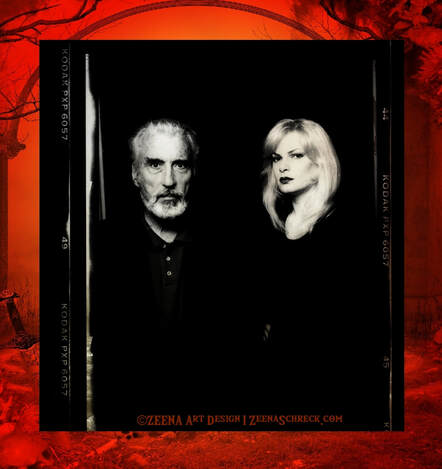 Tony Sokol at The Chiseler Online Magazine interviews Zeena about her memories of actor Christopher Lee: [Begin excerpt] The interdisciplinary avant garde artist spoke exclusively with the Chiseler about the legendary actor. Zeena “met Christopher Lee as a result of being co-producer for the CD ‘Christopher Lee Sings Devils Rogues and other Villians.’ Specifically, I first met him at the apartment in Los Angeles that [former husband] Nikolas and I rented for him and his wife Gitte to stay in while we worked on the recording of ‘Christopher Lee Sings Devils Rogues and other Villains.’ ” Long before Lee recorded with the symphonic power metal group Rhapsody of Fire, he was involved with “Christopher Lee Sings Devils, Rogues & Other Villains (From Broadway To Bayreuth And Beyond).“ “Nikolas knew of Lee’s love of classical music, opera and Broadway musicals. But at that time, the general public only knew Lee for his vampire roles and had little awareness of his musical talent and appreciation,” Zeena explained. Lee maintained that his one regret was his decision not to become an opera singer. “Nikolas conceived of the idea to spotlight Christopher Lee’s considerable singing talents,” Zeena said. “But he knew that to do that effectively, such a project would need to focus on musical selections one would automatically think of Lee singing, appropriately sinister villainous characters from Opera and musicals. “Lee was very enthusiastic at the proposal. So it was through helping Nikolas with the planning, production and coordinating of that project that I got to know Christopher. We recorded it at a studio in Crossroads of the World in Los Angeles. A considerable amount of work and expense went into finding suitable, classically trained musicians and a musical director (Dean Shepherd, who was fantastic) who had the right skills and temperament to work well with Lee.” The friendship endured long after the work was completed. “We stayed in contact throughout the years following that album,” she said. “We’d see him whenever he was in Berlin for the Berlin Film Festival and the ‘Cinema for Peace’ benefit.” [...] “It goes without saying that Christopher was a very colorful person,” Zeena said. “But for me, the most interesting conversations with him revolved around his descriptions of his WWII work as a British Intelligence officer. He talked about parachuting into German enemy Waffen SS camps and, well, he did what the British government trained him to do, which was not pretty.” “I got the impression he was still rather haunted, even decades later, by some of his experiences during the war. Even though he believed that what he did was for virtuous and just reasons,” she added. [...] “He definitely had an interest in magic beyond the roles he played,” Zeena said. “But we need to make a distinction between 'interest’ and 'involvement.’ He had no first-hand involvement in any magical, occult or satanic groups and even declined direct invitations from such groups. “He liked horror fiction of authors like H.P. Lovecraft, Bram Stoker, Algernon Blackwood, etc. But that was purely a literary appreciation. He also had an interest in John Dee, The Golden Dawn and other 19th and early 20th century magical groups,” she explained. “However, it should be stated that Lee had an interest in a wide variety of eclectic subjects, which had nothing to do with occultism. He was simply very well-read and inquisitive by nature,” she added. Lee was in the enviable position to be able to satisfy his many curiosities. “As a result of his years in British intelligence, he’d known figures like Dennis Wheatley, his cousin Ian Fleming, etc., and had heard of their experiences with Aleister Crowley. In fact he was lifelong friends with Dennis Wheatley and agreed with Wheatley’s views on the occult. But their friendship grew out of their mutual intelligence work, not because of occult or magical interests. Christopher Lee was instrumental in getting Wheatley works to film. Wheatley’s The Forbidden Territory was made into a movie starring Ronald Squire as Sir Charles rather than Duke de Richleau in 1934. “It was Lee who convinced Hammer films to buy the rights to Wheatley’s books for the films he would star in,” Zeena said. “But it should be clarified that Lee was very dismissive and wary of occultists, black magicians or satanists.” During Zeena’s involvement in the Lee album, she had the opportunity to ask Lee about the rumor that her father knew Christopher Lee. “When Nikolas and I got to know Lee, we were able to discuss this rumor with him in detail,” Zeena said. “Both Lee and his wife Gitte refuted the rumor vehemently. Lee explained that, as a result of working on the U.S. TV movie Poor Devil, with Sammy Davis, Jr. (who became a Priest in the Church of Satan), Davis tried to ingratiate Lee into accepting an invitation at the behest of my father, offering Lee a copy of The Satanic Bible, personally inscribed and signed by my father. “Lee still had the book in his collection and, on one of Nikolas’s visits to London for preparations of the CD, Lee showed Nikolas the book referring to it as a cheap paperback from the '60s witchcraft fads. Lee didn’t take it at all seriously,” Zeena said. “His wife Gitte recalled another time they visited Sammy and his wife Altovise in Los Angeles, when again Sammy tried to serve as middle-man between Dracula and the Black Pope, and again to no avail. “Lee had no interest. He said Sammy was nuts about my father but Lee saw my father as a 'Johnny-come-lately opportunist and con-man’ within the occult. Lee expressed that he had no intention of ever meeting LaVey. Then, Lee pointedly looked me in the eye and said 'I’m very glad that you had the sense to get out of all of that destructive rubbish,' expounding on what he called 'the ruinous effects of that type of belief system.' ” she concluded. The levelheaded enchantress also got to see the work that went into his actor’s preparation. “Lee took personal responsibility to research his roles, to learn what he could about the characters and the historical context, in order to bring a more believable performance to each character,” Zeena said. “His interest in devilish and monstrous roles was purely a matter of aesthetics and literary appreciation - but not at all a personal lifestyle. “I think he considered the villainous roles he played as having allegorical and moral significance. Sort of like morality tales for a new generation. I don’t think he expected to actually inspire people to want to become the characters he played. He was part Italian and had a very strong sense of religious moral ethics. So even though he befriended Wheatley and personally researched the villainous roles he would play, it was really out of a dedication to portray those roles in as real a way as possible, to understand those characters from their own points of view and to make them believable,” she said. [End of excerpts]* *THERE'S EVEN MORE TO THIS ARTICLE - READ THE FULL INTERVIEW HERE Originally posted to Chiseler on June 9, 2015
In the run-up to Halloween, we're re-posting some of Zeena's past Samhain-specific articles and vintage pictures. This first installment is from Zeena's VICE Magazine column titled, "Halloween in a Satanic Household"To the article:
"As I write this, I'm already decked out in orange and black apparel in preparation for the most wonderful holiday of the year. I'm happy Berlin's finally caught up to the joys of that kooky American custom Samhain, because for the first quarter century of my life, back when I was the devil's defender, Halloween wasn't the fun and merriment it was for many others. Statistically, crime rates rise on Halloween night, so you can imagine the kind of mayhem the HQ of the Church of Satan—a black house centered in one of San Francisco's most conservative, pastel-lined districts—invited upon itself. Early 70s San Francisco was hit by a steep spike in the crime rate, with a special twist of Barbary Coast weirdness added by such local lunatics as the Zodiac Killer, who brought fear into the city even when it wasn't Halloween. My parents didn't allow my friends to visit our house—my daily routine consisted of coming home from school, checking in for headcount, immediately escaping to a friend's house or going out alone to play, then reporting back for dinner at our kitchen's grim mess hall before bed check. You might expect that this drill would be different on Halloween in the most celebrated Satanic household of the 70s, but Halloween was the same old same old. Rituals were only held for the rubes—no special ceremonies necessary for family, who were all a part of Chez LaVey's mitt-camp (criminal fortune-telling rings of the carnival). We didn't spend Halloween celebrating spooky self-indulgence. We spent the harrowing night warding off the many thrill seekers who picked our infamous dwelling as the perfect target-practice for Halloween vandalism. It was bad enough this was a problem every night of the year, but on Halloween it was guaranteed that maniacs would use our house for even more imaginative drive-bys. Like a Dickensian feral child, I always found other neighborhood kids whose parents let me tag along on Halloween nights, to make sure I was safe. When I was eight years old, I thought I had my Halloween strategy all worked out. One of my best friends, Frankie, a Chinese boy with a Siamese cat named Mamacita, persuaded his father to take us trick-or-treating. Frankie would dress as Batman, and I would dress as Catwoman. We spent weeks preparing for Halloween, ardently studying Batman reruns, learning our lines, staging dress rehearsals, and getting all our gear in order for the big day. Frankie and I had a lot of adventures together, encouraging each other into mischief. One day when I showed up for our Halloween training, Frankie was particularly excited about something. In hushed tones, he said he had something to show me. We went into his parents' room, and as he pulled a cardboard box from under his father's bed, he enthusiastically told me, “I found a Q-U-I and other cool magazines! You won't believe it!” What the hell is he talking about? “What's a Q-U-I?” I asked. “You know,” he said, “magazines for men!” Oh! Just as my eye landed on the title, it hit me, “You mean Oui! Sure, I know Oui. My father's got tons those kinds of magazines.” (Frankie misread the title of the October '72 premiere issue as beginning with a “Q.”) Okay. So soft-core porn was a big news to Frankie, but it was small potatoes to me, considering I belonged to a family who first come to prominence having salacious rites covered in porn rags. Cute, I thought. But let's get back to Batman. So we didn't give it much more thought about the magazines... until the big day. Halloween night 1972: I methodically got all decked out in my sexy hand-me-down black leotard, tights and turtleneck sweater. Applied my whiskers, tail, and cat ears. Added some Julie Newmar eyebrow pencil and super sneaky-silent ballet slippers for paws. Every good little ghoul knew it was bad luck to begin trick-or-treating before sundown. But by 5 PM, I couldn't contain myself any longer. I bolted out of that black house like a cat out of hell. Pillowcase in hand, I charged over to the corner grocery store where Frankie lived in the upstairs flat. After a while, I banged impatiently on his door. I could hear Frankie padding down the stairs. Good! I thought. Now we're getting somewhere! When Frankie opened the door, NOT in Batcostume, my heart sank. What happened? Frankie simply said, “I can't go with you tonight. My father found out about the Q-U-I,” and then shut the door. To keep San Francisco safe, Catwoman prowled the darkened streets without the Caped Crusader. I spent a very scary couple of hours stalking the avenues alone, ardently fulfilling my Halloween vow: Give me trick-or-treat or give me death. That Halloween night abruptly came to an end when I knew I'd gone to the wrong house. I ascended the stairwell to a flat absent of festive Halloween decorations, but took my chances ringing the bell in pursuit of one last Snickers bar or pack of Fizzies. The creepy, disheveled occupant looked at me like a trap-door spider looking at its prey. He grinned with an unfriendly smile and said, “What do you want?” Immediately, I realized I'd come to the wrong door. I made something up about confusing the house with my friend's and pivoted to leave. But he grabbed my arm and said, “That's okay, I don't have any candy, but you can come in, and I'm sure I can find something.” In a nanosecond, the survival fear-reflex propelled me down the stairs and straight home. Just one of many close calls in my life. But as you can see by the photo of the booty I plundered, my rat Orwell was happy I returned home safely. After renouncing Satanism in 1990, in favor of sharing life with more considerate and generous entities, I'm freed up to fully enjoy Halloween as I never could when I served in defense of an ungrateful devil." --Zeena Schreck Posted to VICE magazine website on October 26, 2013, 3:00pm at: https://www.vice.com/en/article/4w7dg3/halloween-in-a-satanic-household SUBVERSIVE GROOVES: MUSIC FROM THE DARK SIDE. Music Review of Zeena & Radio Werewolf by Amy Haben1/3/2019 Reposted from Please Kill Me music blog:Amy Haben reviews seven bands and musicians who were also part of notorious religious cults, communes, and porn legends between the 1960s-80s, culminating with the best for last, Zeena & Radio Werewolf. Read the entry for Radio Werewolf below, or go to the full article HERE: https://pleasekillme.com/subversive-grooves/ Radio Werewolf The below article was originally posted in San Francisco newsgroups for Halloween by Jeff Farris, who shares first-hand impressions of Zeena in early life. Farris and Zeena attended the same schools yet have never met. Many thanks to Mr. Farris for allowing us to reprint his article here! An afterword from Zeena follows his article: Lucifer's Daughter in the Richmond District by Jeff Farris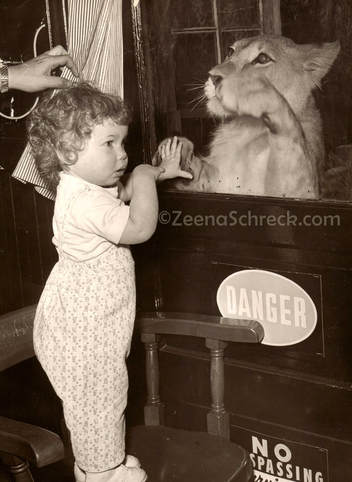 In San Francisco on California Street, between 23rd and 24th Avenues in the Richmond District, there once was a house that was painted pure black long before it was fashionable or cool to do so. The home was rumored to have a real live roaring lion as well as human occupants, we were warned, who were devotees to the Prince of Darkness himself. Other than the austere and gloomy color, it was an unassuming little home just a few blocks down the road from where I grew up. A typical San Francisco A-framed, 3 story Victorian, The Black House, as it was known for many years, was the official First Church of Satan and the home of Anton LeVay, aka, The Black Pope and Lucifer’s Great High Priest and author of the Satanic Bible, as well as his family, including 2 young children and his companion, the self professed sorceress and High Priestess, Diane Hegarty. An ex-carnival worker and notable chronic liar, Anton established the Church of Satan in 1966 where it had a run for about 35 years until it was eventually torn down in 2001, only to be replaced, unceremoniously, by a cheap, 4 unit apartment complex commonly known among locals as a Richmond Special. The son of Russian and Ukrainian immigrants who had arrived in the United States sometime near the turn of the 20th Century, Mr. LaVey had finally made a name for himself in the late 1960’s with his audacious ambition to create the first church of Satan ever, anywhere. San Francisco, at the time, was ripe for such a plan and Anton soon found himself at the center of controversy along with much welcomed attention from the ranks of luminaries such as Hollywood elites, avant-garde artists, and rock superstars of the time. One of his first and most celebrated religious ceremonies held at The Black House was the “Baptism” of his youngest daughter, Zeena, in 1967, when she was just 3 years old. 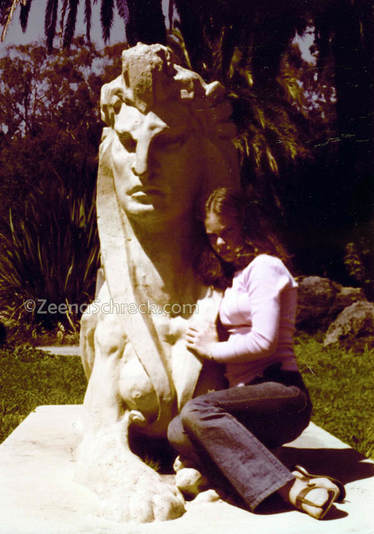 You may have some familiarity with Anton LaVey, but it’s his daughter, Zeena, that I am most curious about today. Anton, who died in 1997, seemed more like an opportunist and a showman than that of a bonafide Satanist, but not Zeena. She was destined for a much more televised profile than her father, becoming the official spokesperson for the Church of Satan in the mid-1980’s during the days of what is now called the “Satanic Panic” wherein born-again, Christian fundamentalists and the U.S. media sensationalized what they said was rampant Satanic Ritual Abuse all across America, especially towards children. In actuality, there was really none happening at all. Some say that it was a modern day witch-hunt fueled by rumors and hearsay, but it was not without serious repercussions when innocent citizens, mostly teachers and staff from 19 daycare centers and pre-schools, were convicted and some even imprisoned based upon the fabricated testimony of toddlers and therapists who said they had uncovered memories of ritual abuse after hypnotizing previous students. Basically, Christians giving false testimony and acting more like Satan, than, well... Satan. Zeena was invaluable during this time, advising police departments throughout the country with a general understanding of Satanic practices which helped quell, at least some, of the satanic ritual abuse allegations. I guess that one could say that the first person to have ever been publicly christened, if I can even use that term, for dedication to Lucifer, could have no other destiny in store for her other than to set the record straight regarding the activities of Beelzebub and his followers. Zeena was one year younger than I, born in 1963, and we went to the same middle school, Presidio Jr. High, on 30th Avenue in between Geary and Clement. I remember her as a very attractive young girl with sensuous lips and an almost ever present furrowed brow. I didn’t know her personally, but being that her father was a somewhat famous, or better yet, infamous San Franciscan, everyone knew who she was, even I. She got pregnant in the 8th grade, at the age of 13, which didn’t help her reputation at all. Vicious rumors went around school stating that it was her father who had impregnated her. Kids can be so mean but, to my knowledge, not one of them had the guts to ever confront Zeena personally. We were all afraid of her clan and no one was brave enough to start trouble with Lucifer’s very own baptized child. Would you? 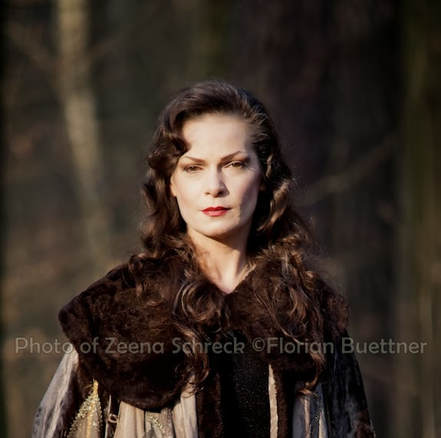 Anyhow, as the years have transpired, I have kept my eye on the life and times of Zeena LaVey, or Zeena Schreck, which is her current last name. I wouldn’t say that I am a stalker, but I have always felt for her as one would feel towards any misunderstood outsider. I felt bad for her, actually, not that she needs my sympathy and she could probably care less of what I think, for that matter. But I’ve always believed that she was a good soul under extraordinary pressure from circumstances beyond her control. She was a San Francisco kid, caught up in those crazy times, no different than I, but definitely more complicated and dark. As you can imagine, Zeena and her family weren’t very welcome in our working class, multicultural, mostly Catholic, and Asian, and Russian Orthodox neighborhood. In a 2012 interview with Vice Australia, she explains that she had to transcribe for the SFPD death threats left for her on her father’s answering machine wherein she was to be raped and killed. She was 11 years old at the time. She also states that her father may have haphazardly fallen into the role of The Black Pope by sheer accident and that the Church of Satan was created after a local publicist described Anton as a neighborhood eccentric and “the first priest of Satan.” Anton then seized the idea and transformed it into a religion and that it all took off from there. To be clear, Anton’s belief system did not include an actual deity or entity that one would call Satan or Lucifer, the Angel of Light. He believed that there wasn’t a devil at all. It was an ego driven theology. Each person is a God, in essence, and the tenets of the religion are almost all selfishly motivated and self aggrandizing. It’s also important to note that the Church of Satan, for the most part, was ultimately a failed venture leaving Anton destitute by the time he died. He sold his soul for nothing more than a limited and fleeting run at popularity, poor thing. By 1990, Zeena had renounced her father’s church and belief structure, and likewise the Church of Satan vehemently denounced Zeena, commencing a campaign to discredit her name. I don’t think she ever had contact with Anton after that. She claimed that her father was basically a charlatan and a con artist and that he never had the depth of knowledge to be a true Satanist and that it was all for show and celebrity. Whether or not I believe her completely is predicated upon the publication of the Satanic Bible, which is still the definitive go to resource for anything Satanic. It is clear that he gave that book some thought. Nonetheless, Zeena then applied her spiritual endeavors towards the Temple of Set, which could best be described as a pre-christian, Egyptian mystery religion, but highly influenced by other ex-members of the Church of Satan and the writings of Aleister Crowley. But even here, Zeena failed to find an environment that was to her liking and she resigned from her post as High Priestess in 2002. She then formed the Sethian Liberation Movement, donned with a title that could only be conjured up by an ex-San Francisco kid who survived the citywide pandemonium that the Symbionese Liberation Army caused when they kidnapped Patty Hearst in the early 70’s. Currently, Zeena is a self avowed Tibetan Tantric Buddhist and she offers counseling services and specifically ministers to victims of extreme circumstances, the socially stigmatized, outcasts, and those otherwise subject to prejudice. By use of yogic, meditative and shamanic exercises, she offers short-range treatment, she says, without having to become an initiate of any particular spiritual path. Like the Phoenix, she claims that she can help you rise from the ashes of difficult experiences, find your own inner mystical resources, and have a spiritual awakening towards a foundation of inner strength. Personally, I believe in her and I want her to succeed. If anyone has experience of overcoming difficulties, Zeena is among those who have. It seems poetic to me that a young girl from San Francisco, without any act of her own volition, was baptized at the tender age of 3 into the milieu of post-modern sensationalized Satanism, only to come out the other side finding peace and stability from the teachings of someone as self effacing and modest as the Buddha. I sincerely hope that she ultimately finds the peace that surpasses all understanding. As a fellow San Franciscan, I am rooting for her. How about you? – Jeff Farris San Francisco, Halloween 2014 Afterword by Zeena:Thank you Jeff, wherever you are! Though it's true we never met, nor shared any words in those years, I never forget a face and knew it was you, because you still look the same, some 40 years later. You are correct that most people didn't have the guts to speak to me then in school, unless antagonistically. The same character traits usually remain on into adulthood. People who refuse to educate themselves about what they're frightened of, find comfort in remaining ignorant. So thank you for your curiosity to educate yourself, and for your candid recollections.
And, as you alluded to, I have found peace and contentment. When we have peace within ourselves and develop intrinsic happiness and relinquish hope for extrinsic sources of happiness, we have peace and joy wherever, and in whatever, situations we find ourselves. Wishing you [all] a fantastically Happy Halloween. ~Ƶeena 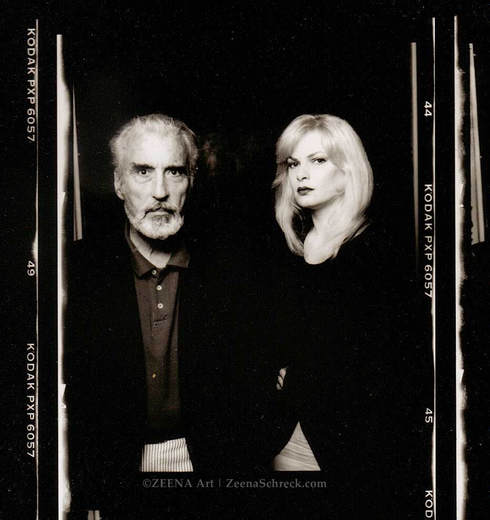 The Chiseler Online Magazine interviewed Zeena about her memories of actor Christopher Lee: The interdisciplinary avant garde artist spoke exclusively with the Chiseler about the legendary actor. Zeena “met Christopher Lee as a result of being co-producer for the CD ‘Christopher Lee Sings Devils Rogues and other Villians.’ Specifically, I first met him at the apartment in Los Angeles that Nikolas and I rented for him and his wife Gitte to stay in while we worked on the recording of ‘Christopher Lee Sings Devils Rogues and other Villains.’ ” Long before Lee recorded with the symphonic power metal group Rhapsody of Fire, he was involved with “Christopher Lee Sings Devils, Rogues & Other Villains (From Broadway To Bayreuth And Beyond).“ “Nikolas knew of Lee’s love of classical music, opera and Broadway musicals. But at that time, the general public only knew Lee for his vampire roles and had little awareness of his musical talent and appreciation,” Zeena explained. Lee maintained that his one regret was his decision not to become an opera singer. “Nikolas conceived of the idea to spotlight Christopher Lee’s considerable singing talents,” Zeena said. “But he knew that to do that effectively, such a project would need to focus on musical selections one would automatically think of Lee singing, appropriately sinister villainous characters from Opera and musicals. “Lee was very enthusiastic at the proposal. So it was through helping Nikolas with the planning, production and coordinating of that project that I got to know Christopher. We recorded it at a studio in Crossroads of the World in Los Angeles. A considerable amount of work and expense went into finding suitable, classically trained musicians and a musical director (Dean Shepherd, who was fantastic) who had the right skills and temperament to work well with Lee.” The friendship endured long after the work was completed. “We stayed in contact throughout the years following that album,” she said. “We’d see him whenever he was in Berlin for the Berlin Film Festival and the ‘Cinema for Peace’ benefit.” [...] “It goes without saying that Christopher was a very colorful person,” Zeena said. “But for me, the most interesting conversations with him revolved around his descriptions of his WWII work as a British Intelligence officer. He talked about parachuting into German enemy Waffen SS camps and, well, he did what the British government trained him to do, which was not pretty.” “I got the impression he was still rather haunted, even decades later, by some of his experiences during the war. Even though he believed that what he did was for virtuous and just reasons,” she added. [...] “He definitely had an interest in magic beyond the roles he played,” Zeena said. “But we need to make a distinction between 'interest’ and 'involvement.’ He had no first-hand involvement in any magical, occult or satanic groups and even declined direct invitations from such groups. “He liked horror fiction of authors like H.P. Lovecraft, Bram Stoker, Algernon Blackwood, etc. But that was purely a literary appreciation. He also had an interest in John Dee, The Golden Dawn and other 19th and early 20th century magical groups,” she explained. “However, it should be stated that Lee had an interest in a wide variety of eclectic subjects, which had nothing to do with occultism. He was simply very well-read and inquisitive by nature,” she added. Lee was in the enviable position to be able to satisfy his many curiosities. “As a result of his years in British intelligence, he’d known figures like Dennis Wheatley, his cousin Ian Fleming, etc., and had heard of their experiences with Aleister Crowley. In fact he was lifelong friends with Dennis Wheatley and agreed with Wheatley’s views on the occult. But their friendship grew out of their mutual intelligence work, not because of occult or magical interests. Christopher Lee was instrumental in getting Wheatley works to film. Wheatley’s The Forbidden Territory was made into a movie starring Ronald Squire as Sir Charles rather than Duke de Richleau in 1934. “It was Lee who convinced Hammer films to buy the rights to Wheatley’s books for the films he would star in,” Zeena said. “But it should be clarified that Lee was very dismissive and wary of occultists, black magicians or satanists.” During Zeena’s involvement in the Lee album, she had the opportunity to ask Lee about the rumor that her father knew Christopher Lee. “When Nikolas and I got to know Lee, we were able to discuss this rumor with him in detail,” Zeena said. “Both Lee and his wife Gitte refuted the rumor vehemently. Lee explained that, as a result of working on the U.S. TV movie Poor Devil, with Sammy Davis, Jr. (who became a Priest in the Church of Satan), Davis tried to ingratiate Lee into accepting an invitation at the behest of my father, offering Lee a copy of The Satanic Bible, personally inscribed and signed by my father. “Lee still had the book in his collection and, on one of Nikolas’s visits to London for preparations of the CD, Lee showed Nikolas the book referring to it as a cheap paperback from the '60s witchcraft fads. Lee didn’t take it at all seriously,” Zeena said. “His wife Gitte recalled another time they visited Sammy and his wife Altovise in Los Angeles, when again Sammy tried to serve as middle-man between Dracula and the Black Pope, and again to no avail. “Lee had no interest. He said Sammy was nuts about my father but Lee saw my father as a 'Johnny-come-lately opportunist and con-man’ within the occult. Lee expressed that he had no intention of ever meeting LaVey. Then, Lee pointedly looked me in the eye and said 'I’m very glad that you had the sense to get out of all of that destructive rubbish, expounding on what he called the ruinous effects of that type of belief system,’ ” she concluded. The levelheaded enchantress also got to see the work that went into his actor’s preparation. “Lee took personal responsibility to research his roles, to learn what he could about the characters and the historical context, in order to bring a more believable performance to each character,” Zeena said. “His interest in devilish and monstrous roles was purely a matter of aesthetics and literary appreciation - but not at all a personal lifestyle. “I think he considered the villainous roles he played as having allegorical and moral significance. Sort of like morality tales for a new generation. I don’t think he expected to actually inspire people to want to become the characters he played. He was part Italian and had a very strong sense of religious moral ethics. So even though he befriended Wheatley and personally researched the villainous roles he would play, it was really out of a dedication to portray those roles in as real a way as possible, to understand those characters from their own points of view and to make them believable,” she said. THERE'S MORE TO THE ARTICLE - READ THE FULL INTERVIEW HERE 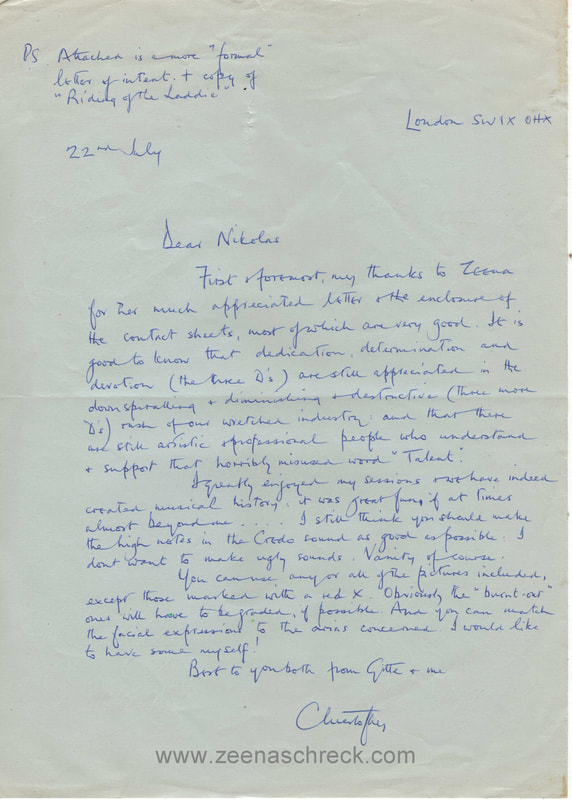 Christopher Lee letter from 22nd of July [1996] "Dear Nikolas, First & foremost, my thanks to Zeena for her much appreciated letter & the enclosure of the contact sheets [photos for the CD], most of which are very good. It is good to know that dedication, determination and devotion (the three D's) are still appreciated in the downspiralling & diminishing & destructive (thee more D's) rush of our wretched industry; and that there are still artistic & professional people who understand & support that horribly misused word “Talent.” I greatly enjoyed my sessions & we have indeed created musical history, it was great fun, if at times almost beyond me....I still think you should make the high notes in the Credo sound as good as possible. I don't want to make ugly sounds. Vanity of course. You can use any or all of the pictures included, except those marked with a red X. Obviously the “burnt out” ones will need to be graded, if possible. And you can match the facial expressions to the arias concerned. I would like to have some myself! Best to you both from Gitta & me, Christopher" San Francisco is currently celebrating the 50th anniversary of the Summer of Love. This week also marks the dark-side of the city's history. On May 23, 1967 Zeena made her international debut as performance-artist at the first public satanic baptism, orchestrated by her parents' in-house carnival show. She has commemorated the event by creating a personally charged meditative ritual in the form of a soundscape and video collage. [Video below] |
SUPPORT FOR WORKS IN PROGRESS
Zeena is an entirely independent, self-funded artist. Her livelihood and funding for creative projects rely solely on commissioned artwork, teaching and lecturing engagements, performances and purchases of her products and music, as well as from donations from private patrons and sponsors. If you would like to pledge your support towards the production costs of current works in progress, please use the PayPal donation button at the top of page. Thank you for your support of Zeena's work! Archives
May 2024
Categories
All
|
Zeena's Bandcamp page |
Copyright ©2024 Zeena Schreck. All rights reserved.
|





